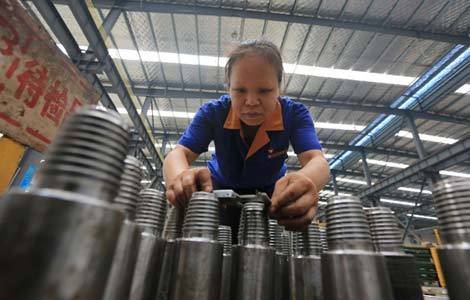Chinese SMEs eye overseas markets for investments
Updated: 2013-07-16 15:07
(cctv.com)
|
||||||||
SMEs have been a major engine for China's growth. They contribute to nearly 60 percent of the country's GDP and provide more than 80 percent of its jobs. But their own growth is limited by funding challenges, slowing demand abroad, and increasing production costs. To overcome these hurdles, many are considering investing in overseas markets.
During good times, everyone grows, but during bad times, the most vulnerable players in the market - the small and medium sized enterprises - are the most affected. Weakening demand abroad, increasing labor costs, and appreciation of the RMB are squeezing their profits drier.
"External demand is weakening which is very difficult for export oriented SMEs. Many industries are facing the problem of overcapacity. Some companies are only producing at 50% of their capacity." Zhang JingQiang, Excutive VP of China Association of SMEs said.
To solve the problem of overcapacity and increasing costs, some SMEs are moving some of their production capacity to other emerging markets, to take advantage of lower costs, avoid taxes and trade protectionism.
"We are a printer cartridge producer, we are considering investing in places like South Africa, because the labour costs their are much lower. They are like China 20 years ago." Shi Xuanying, Deputy General Manager of Shenzhen South Yusen Electron Co. said.
Emerging economies want to attract Chinese investors to not only extract resources but also establish production chains locally to boost their economies.
The industries that Chinese investment projects focus on include mining, agriculture, manufacturing and infrastructure.


 Obama urges restraint amid protests
Obama urges restraint amid protests
 Putin wants Snowden to go, but asylum not ruled out
Putin wants Snowden to go, but asylum not ruled out
 Apple to probe death of Chinese using charging iPhone
Apple to probe death of Chinese using charging iPhone
 Investment falters as industrial activity flags
Investment falters as industrial activity flags
 Rape victim's mother wins appeal
Rape victim's mother wins appeal
 Reproduction of 'Sunflowers' displayed in HK
Reproduction of 'Sunflowers' displayed in HK
 Land Rover enthusiasts tour the world
Land Rover enthusiasts tour the world
 US star sprinter fails drug test
US star sprinter fails drug test
Most Viewed
Editor's Picks

|

|

|

|

|

|
Today's Top News
Spain apologizes to Bolivia for plane delay
International cotton contract in the works
Smithfield shareholder still presses for break up
China calls for new talks on Iran nuclear issue
Global warming may largely raises sea level
Putin wants Snowden to go, asylum not ruled out
US: China can balance own growth
Top foreign study destinations for Chinese
US Weekly

|

|






